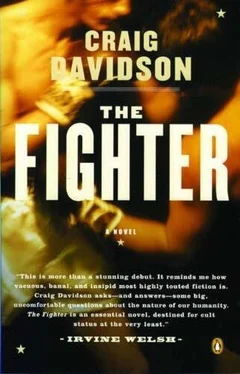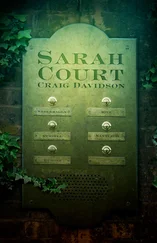“I’d like a ticket to Bangkok. Your earliest possible departure.”
The ticket agent cleared her throat and asked mildly, “Will that be round trip?”
“One way.”
Her lacquered fingernails tapped the keyboard. “Our next flight departs in one and a half hours. Business or personal, sir? The Customs officials will need to know.”
“Ever seen a guy more in need of a vacation?”
The ticket cost $3,400. He paid cash and headed toward the departure gates.
“Sir?”
“Hmm?”
“You’re bleeding a little.”

The terminal was deserted. A janitor guided a miniature Zamboni across the floor, leaving strips of wetly polished tile. Through soaring plate-glass windows he saw mail jets and freight carriers taxi into lit bays. A family dressed in Hawaiian beach finery was sprawled over some padded benches. Paul wondered whether he’d be allowed through airport security. He was a little beat-up, sure, but it didn’t make him a flight risk — did it?
He lay out on a bench and slipped into an exhausted sleep and dreamed he was on a trawler.
It was nighttime; penlight stars winked. He stood on the gunwale but could see no horizon, no line where water gave way to sky. The water was shiny as patent leather and so depthless he felt a touch of vertigo.
“There you are.”
A man clambered up a ladder from the engine compartment. His face was squarish, knotted, weather-roughed. White powder had dried to a crust around his eyes.
“You were expecting me?”
“I was, eventually,” the captain told him. “Wasn’t sure what you’d look like — it’s tough to tell from the inside.”
“I’m sorry — inside what?”
The captain walked to a boom jutting off the starboard side. He picked up a tin bucket and dipped it over the side. When he set it on deck Paul knew at once that it wasn’t water in the bucket. Too dark, syrupy, and red.
“Inside of you,” the captain told him. “Your heart.”
The vista reconfigured to fit this understanding. No horizon: only the curved rim of Paul’s aortic chamber. What he’d mistaken for stars were gleaming white nodules lodged in the meat of his atrial walls. The opening and closing of his pulmonary valves created soft waves. Like being in a massive undersea cavern.
Paul placed his hand on his chest: not the slightest tremor.
“My own heart.” There was no reason to doubt it. “Am I dead?”
The captain considered it, then shook his head. “Neither you nor I would be here, that was the case.”
“How long have you been…?”
“As long as you’ve been,” the captain said, simply.
“And are there others like you,” Paul asked, “in… other parts of me?”
He shrugged, as if Paul had tendered the prospect of life on remote planets. He bit the end off a cigar, spat the stub overboard, and lit it with a wooden match.
“I’d really rather you didn’t,” said Paul.
“This?”
The captain indicated the cigar. “My friend, it’s the least of your worries.”
A winch was attached to the boom and the captain cranked it; wet rope wound over a metal drum. He cut Paul an exasperated look. “Pair a broken arms?”
Paul took hold of the winch. The currents were stiff; he was sweating before long.
“What are you fishing for?”
“Not fishing,” the captain told him. “Dredging.”
A net rose from the dark bottom of Paul’s heart; the captain swung the boom and spilled the catch over the deck. Amidst the pulpy tissue and clotted blood monstrous shapes flapped and heaved. They were white, whatever they were, whiter than the nodule-stars, eyeless, faceless, boneless as jellyfish. It wrecked Paul to know such things existed somewhere within him.
“What,” he struggled, “what are they?”
The captain’s features creased with disappointment. “Hoping you’d be able to tell me.”
They held no universal shape, no unifying properties at all. Some were large, others quite small. If anything, they resembled shreds of animate blubber. Paul imagined a huge formless mass rotting in a lightless cavern of his heart.
“Nothing you’d want to eat,” the captain said. “No nourishment at all.”
He lowered his boot onto one. A wet squitch. “They’re not at all hardy and happy enough to die. Hell, seem only grudgingly alive in the first place.”
“And… this is what you do?”
“All my life.” He peered down at the abominations. “All my life.”
“I’m sorry,” was all Paul could think to say.
“I’ve been hauling up a lot less lately. Used to, I’d bring up four or five nets. Now, only one and it’s not even quite full.”
“Do you think that’s a good thing?”
He gave Paul a warm smile. “Makes my job a helluva lot easier, leastways.”
The creatures died quickly. Some melted; others calcified and sifted into powder; the rest turned to flakes that blew away over the gunnels. Soon there was no indication they’d ever existed.
Paul woke up on the terminal floor. The family dressed in Hawaiian shirts was looking at him strangely and Paul wondered if he’d been screaming in his sleep. Then he remembered the dream, those flapping blubber-creatures, and felt sick in his own skin.

He found a restroom on the terminal’s south side. A few stitches had popped; blood wept through the Dermabond seal. Stripped to the waist, he blotted his face with toilet paper. He blotted too hard and popped another stitch. He leaned over the sink and let himself drain.
Paul stepped back and considered his reflection. His torso was splotched with purple bruises and scored with gloveburns. Destroyed but still standing. Beaten and bashed and bloody, but there he was.
With his right foot set slightly before his left, his body turned at such an angle as to present as spare a target as possible — turn yourself into a pane of glass, as Lou would say — Paul began to shadowbox. Flashing out the left hand and puffing short breaths — tsh! tsh! tsh! — the sound echoing sharply off the tiles. He executed the Fitzsimmons shift and threw a right hook at his reflection. He was warming up; the sweat was flowing. He felt loose and agile and strong.
He threw punches and thought about it all. Thought about the kid, Rob, and about his uncle, Tommy. Thought about Lou and about Stacey. Thought about his mother and his father and felt nothing but gratitude and love.
Five jabs in quick succession — ts-ts-ts-ts-tshh! — right hook, right hook, left uppercut, step back bobbing on the tips of his toes, sneakers squeaking. He considered how it all started as a simple desire. To banish weakness and inhabit strength. Develop those defensive mechanisms he’d never used. The porcupine, its quills. The scorpion, its sting. He juked and feinted then lashed out with a right hand, knuckles grazing the mirror. Drops of blood-tinted sweat wicked off his brow.
Why didn’t you ever teach me to be a man?
He’d wanted to ask his father this question last night. Yet he realized his father had taught him how to be a man — a man for this time and era. Where before the teachings had been learned in fields or factories or foxholes, Today’s Man learned in lecture halls and boardrooms. Where before men wore coveralls or buckskins or the colors of whatever side they fought for, Today’s Man wore herringbone jackets and loafers, his nails were manicured, his hair smelled of nectars. His father had taught and he had learned. Those lessons had held him in fine stead until his path crossed with Yesterday’s Man with his bloodlust and quick fists and old ways; only then did he realize that all he’d been bred for was useless. Perfect in his element, fragile and susceptible outside of it.
Читать дальше













